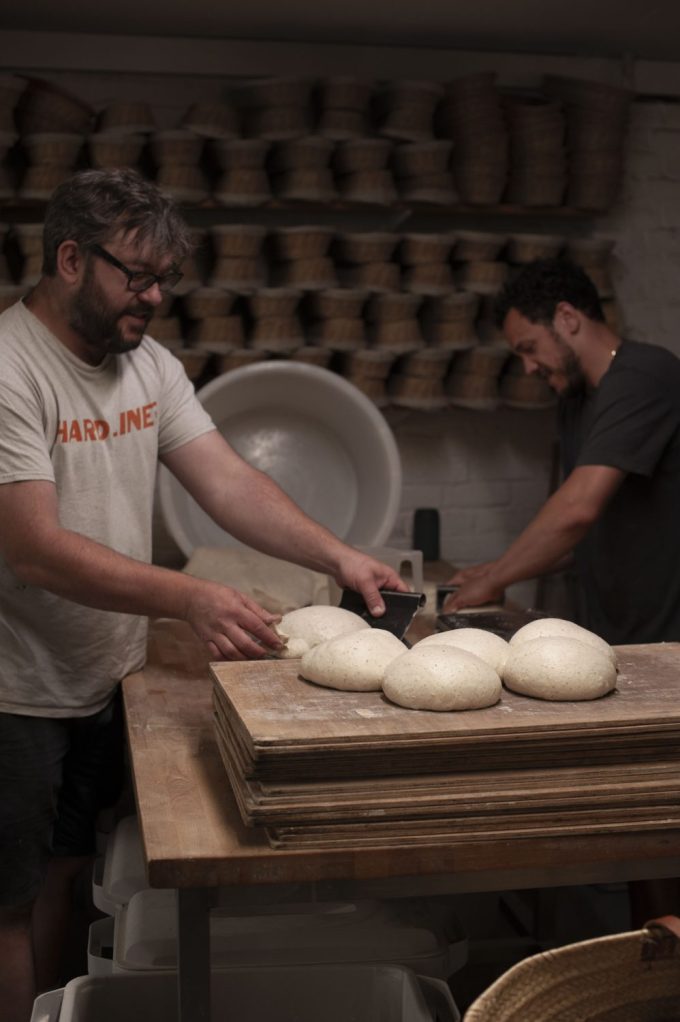
Is fake sourdough just duping the middle classes? … or is Sourfaux far more damaging than this? Is it undermining the artisan bakers livelihood?
I spent a week with Adam over at Grain and Hearth recently. The bakery won the best bakery in Kent in the national bakery awards.
Adam and I go chatting about he perception of good bread being just available to privileged individuals.
On the one hand I am keen that we make good nourishing bread available for all. On the other hand this needs to be done in a considerate way
So whilst my focus over the many years I have been a baker has been in encouraging activism in baking and teaching the importance of authenticity and integrity in the world bread and sourdough and beyond, so I wanted to to raise a few points, and it is relevant to an article in The Telegraph about “sourfaux” bread or fake sourdough bread masquerading as genuine sourdough. As usual, it seems to place the emphasis on the middle classes being hoodwinked over and above the deception to the consumer of the benefits of traditional sourdough and of the highjacking of the method by the ultra-processed food industry. I feel that the middle-class sourdough narrative is almost as worn out as the journalists writing the features -and for social justice we must make good bread accessible to all.
So, for those of you who are equally bored of the middle-class outrage story, here’s 6 reasons why I believe we have to call out the fakes and why authenticity matters.
- Social Justice and Ethical Considerations: The issue of misleading sourdough labelling goes way beyond mere consumer deception; it’s a matter of food ethics. For many people, choosing authentic sourdough is not just about taste or health but also about supporting artisanal bakers who invest time and skill in traditional methods. When supermarkets sell ‘sourfaux’ as real sourdough, they’re not only undermining public trust but also the livelihoods of artisan bakers who are committed to genuine sourdough practices. This matter ties into broader themes of social justice within the food industry, advocating for transparency and respect for artisanal food traditions, something I feel we have to actively protect if we are to stand any chance of holding back the levels of processed food consumed.
- Nutritional Integrity and Public Health: From a nutritional standpoint, the differences between real sourdough and ‘sourfaux’ are significant. I have been writing for years on how authentic sourdough fermentation enhances nutrient bioavailability, improves digestibility, and offers potential benefits for gut health and blood sugar control. These benefits are largely absent in ‘sourfaux’ breads, which means consumers are misled into thinking they are making a healthier choice when they are not. This misrepresentation can have implications for individuals managing blood sugar, or IBS, and on a broader scale for public health, particularly for individuals for whom nutrition is key to managing health conditions.
- Environmentalism and Sustainable Practices: The production of genuine sourdough, in the main, aligns with sustainable food practices. Traditional sourdough baking often uses locally sourced, organic ingredients and involves a slow fermentation process with minimal waste and energy usage. In contrast, the mass production of ‘our faux’ often involves a higher carbon footprint through plastic packaging and refined white flour, enzymes, emulsifiers and the transportation of ingredients and final products. Promoting authentic sourdough is thus also a step towards supporting environmentally sustainable food practices.
- In light of these factors, the issue of ‘sourfaux’ in supermarkets is not just a matter of consumer choice but touches on deeper issues of ethical food production, nutritional honesty, public health, and environmental sustainability. It’s essential for consumers to be aware of these aspects to make informed choices that align with their values and health needs.
- Health Implications: These discrepancies are not just about taste or artisanal baking traditions but also about the health benefits of genuine sourdough. The complex fermentation process in true sourdough has numerous benefits for digestive health, nutrient absorption, blood sugar control, immune function, heart health, and mental well-being, which are not guaranteed in these ‘sourfaux’ versions
- I feel that one of the most insidious things that the proliferation of “sourfaux”—bread marketed as sourdough but lacking authentic or real fermentation processes is the threat to artisan bakers. Artisan sourdough, crafted through traditional long fermentation methods, not only delivers superior taste and nutritional benefits but also represents a dedication to skilled craftsmanship. In contrast, sourfaux, is often produced with short fermentation and as a straight dough, which undermines the value of genuine artisanal efforts by flooding the market with inferior products that can be sold at lower prices. Consumers need to be aware that many of the breads they are sold are, in my view not properly fermented and so the industrialisation of sourdough bread itself can be deceptive. Misleading consumers erodes the appreciation for true artisan bread. In turn this diminishing the livelihood of bakers who rely on the integrity of their craft. As a result, artisan bakers face unfair competition, struggling to maintain their businesses while preserving traditional bread-making techniques. The cultural heritage and artisanal quality of bread-making are thus jeopardised, with long-term implications for both consumer health and the sustainability of local baking traditions.




 An overview of Sourdough Bread and IBS
An overview of Sourdough Bread and IBS
Leave a Reply